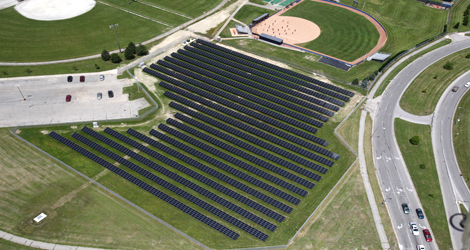Physicists at The University of Toledo plan to monitor the power output of its solar panels on Main Campus during the solar eclipse Monday, Aug. 21.
The team plans to display the data in real time during UT Ritter Planetarium’s free, public viewing event from 12:30 to 4 p.m. on the campus lawn between Ritter and McMaster Hall.

Solar electricity produced by solar arrays on the Scott Park Campus of Energy and Innovation, shown here, and at the R-1 Building along Dorr Street will be monitored during the eclipse.
Toledo is expecting a partial eclipse where the moon will block nearly the entire sun. According to Alex Mak, UT associate planetarium director, Toledoans should see an approximately 80 percent eclipse, weather permitting.
“As the moon moves into place, it will of course block sunlight that powers the solar panels,” Ellingson said. “In regions of the country with high penetration of solar photovoltaic arrays, grid operators will need to shift electricity locally and regionally to meet the temporary shortfall from solar arrays.”
According to the Energy Information Administration, no electricity reliability issues are expected in the United States.
During the eclipse viewing celebration, UT astronomers will have several safely filtered telescopes set up outside looking at the eclipse.
In the event of clouds, a web stream of the eclipse from other locations across the country will be playing in McMaster Hall Room 1005.